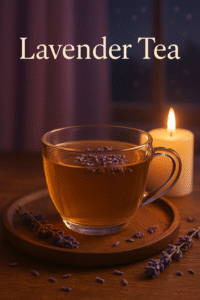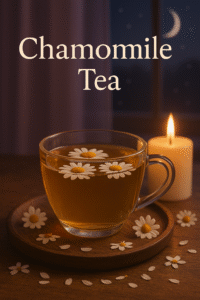
⚠️ Affiliate Disclaimer: This post may contain affiliate links, which means I may earn a small commission — at no extra cost to you — if you make a purchase through one of these links. I only recommend products or services I genuinely trust and believe can provide value. Thank you for supporting My Medical Muse!
Bedtime Herbal Tea for Anxiety and Cortisol
Are your nights hijacked by anxiety and stress? You’re not alone and you’re not helpless either. Herbal teas are more than just a cozy bedtime ritual. The right ingredients can lower cortisol, ease anxiety, and help you fall asleep faster naturally and gently, without side effects.
This post reveals science-backed calming teas, DIY blends, and tips to turn your evening cup into a powerful sleep aid.
Table of Contents
- 1. Why Anxiety and Cortisol Disrupt Sleep
- 2. What Makes a Tea “Bedtime-Friendly”?
- 3. Best Herbal Teas for Anxiety and Cortisol Balance
- 4. DIY Herbal Bedtime Tea Recipe
- 5. When and How to Drink Bedtime Tea
- 6. Science-Backed Benefits of Herbal Teas for Sleep
- 7. Tips for Making Your Tea More Effective
- 8. Common Mistakes to Avoid
- 9. Final Thoughts
Why Anxiety and Cortisol Disrupt Sleep
Let’s be honest, it’s not always the coffee or netflix keeping you awake. Sometimes, it’s your own mind racing thoughts, tight chest, thumping heart, that frustrating “tired but wired” feeling. This is often the work of elevated cortisol, your body’s main stress hormone.
At night, your body is supposed to wind down and produce melatonin but if cortisol spikes, melatonin crashes and so does your chance of deep rest.
What Is Cortisol?
Cortisol is produced by your adrenal glands, which sit right on top of your kidneys. It plays a critical role in energy, metabolism, immune function, and most importantly for sleep.
While cortisol is helpful in small doses (it wakes you up in the morning), too much of it at night leads to:
- Difficulty falling asleep.
- Light, unrefreshing sleep.
- 2–3 AM awakenings.
- Morning fatigue, anxiety, and brain fog.
Chronic high cortisol can also trigger or worsen: Anxiety disorders, insomnia, depression, blood sugar imbalances, inflammation, hormonal issues like PCOS or amenorrhea. That’s why regulating cortisol and calming the nervous system at night is crucial especially if your sleeplessness feels emotional or stress-driven.
Also Read: Everything you need to know about Cortisol
What Makes a Tea “Bedtime-Friendly”?
Not every herbal tea is good for sleep. A true bedtime tea should do more than relax you, it should work biochemically to prepare your body for rest.
Here’s what to look for in a proper nighttime tea:
1. Caffeine-free
2. Contains calming or adaptogenic herbs
3. Helps activate GABA : The brain’s calming neurotransmitter.
4. Indirectly supports melatonin production.
5. Relaxes both mind and body.
6. Helps regulate blood sugar and hormones.
7. Supports digestion, which is linked to sleep via the gut-brain axis.
Best Bedtime Herbal Teas for Anxiety and Cortisol Balance
Let’s break down the best herbs that promote restful sleep, reduce cortisol, and ease anxiety with science to back them up.
1. Chamomile
A gentle, floral herb rich in apigenin, which binds to GABA receptors, known to reduce anxiety and improve sleep quality. A 2016 trial showed chamomile improved sleep and lowered depressive symptoms in postpartum women, it is best for light sleepers and sensitive stomachs.
2. Lemon Balm (Melissa officinalis)
A lemon-scented member of the mint family. It Soothes the nervous system, eases overthinking, and lowers cortisol. A study shows Lemon balm extract lowered cortisol and improved mood under stress (Nutrients, 2020). it is Ideal for overthinkers and stress-eaters.
3. Ashwagandha Root
A powerful adaptogen that helps regulate the HPA axis, it balances cortisol and improves your body’s stress response. A 2021 meta-analysis confirmed that ashwagandha reduces cortisol and improves sleep latency. It can be added to tea or taken in capsule form alongside your brew.
4. Passionflower
Naturally boosts GABA, calming the mind and nervous system. It reduces insomnia, especially in anxious individuals. A week-long study found passionflower tea significantly improved subjective sleep quality, it pairs well with chamomile or lemon balm for added potency.
5. Tulsi (Holy Basil)
A sacred adaptogen in Ayurvedic medicine. It helps balances stress hormones and supports deep, non-sedating rest. Tulsi has been shown to reduce cortisol and improve mood and resilience. it is great for burnout, adrenal fatigue, and wired-but-tired types.
6. Lavender

Famous for its relaxing aroma and it works from the inside too as it helps calms physical tension, nervousness, and restlessness. Lavender improved deep (slow-wave) sleep and reduced anxiety in multiple trials. it blend with mint or lemon balm for a floral, relaxing tea.
7. Valerian Root
A natural sedative with strong GABA-enhancing properties, which mimics the calming effects of anti-anxiety medications. A review of 16 studies found valerian effective for mild to moderate insomnia.

DIY Herbal Bedtime Tea Recipe
Here’s a soothing, multi-herb blend that works synergistically to calm anxiety, lower cortisol, and support deep rest.
Calming Cortisol-Reducing Bedtime Tea
Ingredients:
- 1 tsp dried chamomile
- 1 tsp dried lemon balm
- ½ tsp passionflower
- ½ tsp lavender buds
- ½ tsp ashwagandha powder (or take a capsule alongside)
- 1–2 slices fresh ginger (optional – supports digestion)
- 1 tsp raw honey (optional – adds sweetness and comfort)
Instructions:
- Add all herbs to a teapot or infuser.
- Pour 1.5 cups hot water (just under boiling).
- Cover and steep for 8–10 minutes.
- Strain and add honey if desired.
- Sip slowly 30–60 minutes before bed.
Tip: Make it a daily ritual. The repetition helps train your nervous system to recognize bedtime cues.
When and How to Drink Bedtime Tea
- Best time: 30 to 60 minutes before sleep
- Best setting: Dim lights, quiet room, no screens
- Best pairing: Journaling, deep breathing, meditation, prayer
- After food: Avoid drinking tea right after large meals
For best results, drink it daily for 7–10 nights consistently.
Science-Backed Benefits of Herbal Teas for Sleep
Here’s a quick look at the clinical evidence behind these herbs:
| Herb | Study Findings |
| Chamomile | Improved sleep and mood postpartum (Journal of Advanced Nursing, 2016) |
| Lemon Balm | Lowered cortisol and anxiety symptoms (Nutrients, 2020) |
| Ashwagandha | Reduced cortisol and improved sleep latency (Sleep Medicine Reviews, 2021) |
| Passionflower | Improved sleep quality and reduced anxiety (Phytotherapy Research, 2011) |
| Lavender | Enhanced deep sleep and lowered anxiety (Frontiers in Pharmacology, 2019) |
These herbs don’t knock you out, they work with your body to restore its natural sleep rhythm.
Tips for Making Your Tea More Effective
1. Choose organic, fresh herbs because potency matters
2. Always cover while steeping, it keeps essential oils from evaporating
3. Drink it freshly brewed and don’t reheat leftovers.
4. Make it a wind-down ritual, your body learns through repetition.
5. Pair with a magnesium-rich snack like banana, almonds, or pumpkin seeds for added relaxation.
Common Mistakes to Avoid
- 1.Cheap tea bags, Often stale or low-dose.
2. Too much honey or sugar, spikes blood sugar and cortisol.
3. Waiting until panic strikes is wrong, herbal teas are preventative, not emergency tools. - 4. Expecting instant results, herbs work cumulatively, not like pills.
5. Sipping while scrolling, blue light cancels melatonin and stress relief.
Final Thoughts
If you’re stuck in a cycle of restless nights and anxious thoughts, it’s time to ditch the dependency on sleep aids and embrace a natural solution Herbal teas offer a gentle, effective, and proven way to reset your nervous system, lower cortisol, and help you finally sleep through the night. So tonight:
Light a candle, brew a cup, breathe deeply and sip your way into calm, restorative sleep.
👩⚕️ Need Personalized Health Advice?
Get expert guidance tailored to your unique health concerns through MuseCare Consult. Our licensed doctors are here to help you understand your symptoms, medications, and lab results—confidentially and affordably.
👉 Book a MuseCare Consult Now